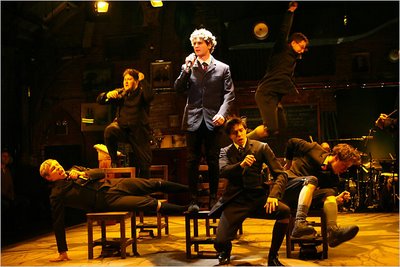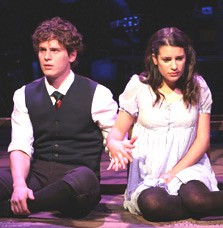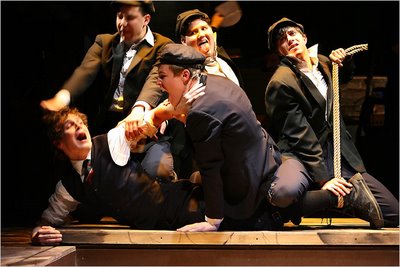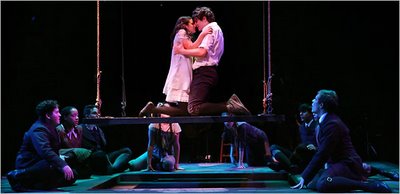Wednesday, December 06, 2006
Broadway gets some Spring in its step (and some bite marks)

By Josh R
In Annie Hall, Woody Allen famously observed how if a shark stops moving, the inevitable consequence is death. In context, this bit of oceanographic trivia served as a metaphor for the foundering relationship between Allen's onscreen alter ego, Alvy Singer, and the title character played by Diane Keaton. Noting the growing distance between them, Alvy was forced to conclude that "what we have here is a dead shark."
For a long time now, theater aficionados have lamented the state of the Broadway musical, a long-cherished institution whose fortunes have fallen precipitously over the past several decades and has arguably become about as relevant to contemporary popular culture as Viennese operetta. By the 1990s, New York's signature form of entertainment had begun to attain the haggard visage of a tired beast of burden, ready to be put out to pasture if not shipped off to the glue factory — while stalwarts such as Stephen Sondheim, Kander & Ebb and Andrew Lloyd Webber continued to put forth new offerings of diminishing quality, no fresh voices were coming forth to fill the void. Lest one might be tempted to credit the dearth of emerging new talent to lack of initiative or an absence of inspiration, it should be noted that an entire generation of musical theater artists was virtually wiped out by the AIDS epidemic of the 1980s. The Broadway community, and the musical theater community in particular, sustained incalculable losses; it's impossible to know what the barren '90s might have offered had the lost generation lived to reach maturity (a fact which is startlingly relevant to the show which is the subject of this piece, if you read on).
Devotees of the musical stage can take heart — if recent years haven't exactly marked a complete return to form, the 21st century
 has nevertheless provided eager fans with some encouraging signs of life. The 1995 season infamously offered only two "new" musicals — one a bookless review of old Leiber & Stoller jukebox standards, the other a campy rehash of a classic film penned by a composer who'd been around since the late 1960s and operated, theme-park style, via hydraulic lifts (for the uninitiated, that would be Smokey Joe's Cafe and Sunset Boulevard, respectively). For a bit of contrast, the current season is not yet half over, and already we have two bold, challenging new musicals by young composers who can actually be credited with having — gasp — a fresh and innovative approach to content and form. The first of these is Michael Korie and Scott Frankel's Grey Gardens, which I have written about in a previous post. The second is Spring Awakening, which opens at The Eugene O'Neill Theatre on Sunday. While these shows are not without their flaws, their mere presence on Broadway indicates that the shark isn't quite ready to give up the ghost. If it hasn't fully found its bearings after years of torpid immobility (it'll take a while before it starts cutting through the currents like "Jaws" again), at least it's moving in the right direction.
has nevertheless provided eager fans with some encouraging signs of life. The 1995 season infamously offered only two "new" musicals — one a bookless review of old Leiber & Stoller jukebox standards, the other a campy rehash of a classic film penned by a composer who'd been around since the late 1960s and operated, theme-park style, via hydraulic lifts (for the uninitiated, that would be Smokey Joe's Cafe and Sunset Boulevard, respectively). For a bit of contrast, the current season is not yet half over, and already we have two bold, challenging new musicals by young composers who can actually be credited with having — gasp — a fresh and innovative approach to content and form. The first of these is Michael Korie and Scott Frankel's Grey Gardens, which I have written about in a previous post. The second is Spring Awakening, which opens at The Eugene O'Neill Theatre on Sunday. While these shows are not without their flaws, their mere presence on Broadway indicates that the shark isn't quite ready to give up the ghost. If it hasn't fully found its bearings after years of torpid immobility (it'll take a while before it starts cutting through the currents like "Jaws" again), at least it's moving in the right direction.Spring Awakening is based on a play by Franz Wedekind, originally published in 1891 and banned in Germany (and in other parts of the world) for decades to follow. It's not hard to understand why. Teen pregnancy, teen suicide, homosexuality, abortion, incest, and the critical importance of sex education for young people beyond what can be
 provided by parents (who often fail in the efforts to execute that responsibility) are hot button issues today — one can only imagine the indignation that greeted such a frank discussion of topics at the tail end of the 19th century. The play examines a group of school children at the age of burgeoning sexual awareness, struggling to make sense of their feelings and receiving no help from a puritanical adult establishment which prioritizes virtue, or at least the appearance of it, above the emotional well-being of their young. Taught to suppress or deny their feelings rather than to understand them, this generation has no means of coping with their biological and emotional urges, and most meet with dire fates as a result of their own ignorance (the teenage heroine, for example, doesn't know about the birds and the bees until after she has become pregnant). It's incendiary stuff, and if you imagine that the creators of the musical adaptation aren't conscious of the frightening parallels that Wedekind's century-old observations have to the culture of the here and now, think again.
provided by parents (who often fail in the efforts to execute that responsibility) are hot button issues today — one can only imagine the indignation that greeted such a frank discussion of topics at the tail end of the 19th century. The play examines a group of school children at the age of burgeoning sexual awareness, struggling to make sense of their feelings and receiving no help from a puritanical adult establishment which prioritizes virtue, or at least the appearance of it, above the emotional well-being of their young. Taught to suppress or deny their feelings rather than to understand them, this generation has no means of coping with their biological and emotional urges, and most meet with dire fates as a result of their own ignorance (the teenage heroine, for example, doesn't know about the birds and the bees until after she has become pregnant). It's incendiary stuff, and if you imagine that the creators of the musical adaptation aren't conscious of the frightening parallels that Wedekind's century-old observations have to the culture of the here and now, think again.
While the piece remains set in 1891, composer Duncan Sheik and lyricist Steven Sater have outfitted Wedekind's 19th century cautionary tale with a decidedly modern score which runs the gamut from rock to folk-tinged pop — the range is impressive, suggesting influences as diverse as Kurt Cobain and Ani DiFranco, yet it all blends together into a unified whole. The decision to use a contemporary sound was a wise one, lending the proceedings a feeling of edginess and currency, and providing a musical metaphor for the roiling emotions of adolescent angst (something period music might not have captured to the same degree). The obvious inspiration is Rent, the groundbreaking musical by Jonathan Larson which planted its finger firmly on the pulse of mid-90s youth culture, harnessing the pulsating rhythms of hard and soft rock, pop, grunge, hip-hop and Latin music to its re-telling of Puccini's La Boheme. That show had a palpable current of electricity coursing through its veins when it premiered in 1996; even though it may have shown some of its limitations over the passage of time, it's still a brash, bold work of theatrical showmanship which provided Broadway with a welcome jolt of energy by tapping into a new musical idiom.

Spring Awakening doesn't quite reach the breathtaking heights of its predecessor — it lacks the brazen theatricality of Rent, and Sheik's score doesn't quite grab you by the throat the way Larson's did (it's more a really great night of music in a downtown club than a headlong plunge into a rave). The show also could have used more humor to balance out the pathos, something Rent managed with surprisingly nimble dexterity, and
 when it stops singing and starts talking, the occasionally creaky dialogue does sound like it was cribbed from a social polemic penned in 1891. Still, these are minor quibbles when you consider how rare it is to find a new work of musical theater that feels fresh, passionate, and unequivocally alive. Much of the credit for this should be given to the cast who, with exception of two actors who play all the adult roles, range in age from 16 to 23 (some look even younger). The well-selected ensemble is comprised of vastly talented performers who may seem idiosyncratic by Broadway's standards — forget about the air-brushed faces and voices of most Broadway choruses — but bring fierce, passionate conviction to their roles and serve the demands of the score beautifully. While Sater's lyrics can occasionally be abstract to the point of inscrutability (I was relieved to hear that "The Pirate Song," the most obliquely worded of the bunch, had been cut for the Broadway production), they are beautifully delivered, consequently give the words more resonance than they would on their own. Special praise must be reserved for Lea Michele, who thoughtfully portrays the confusion of an adolescent girl both fascinated and frightened by her dawning sexuality, and John Gallagher Jr., whose portrayal of the haplessly awkward Moritz verges on caricature but provides a portrait of unabated despair which becomes almost painful to witness. The standout, however, is Jonathan Groff as the intrepid Melchior, who serves as the inadvertent instigator of much of the trouble that befalls the other characters. Blessed with heartthrob looks and an expressive, supple tenor which can shift seamlessly into a rocker's bruised battle cry, Groff provides the show with its most dynamic presence, and his sensitive enactment of the character's ultimate, devastating realization is worthy of the tears it inspires.
when it stops singing and starts talking, the occasionally creaky dialogue does sound like it was cribbed from a social polemic penned in 1891. Still, these are minor quibbles when you consider how rare it is to find a new work of musical theater that feels fresh, passionate, and unequivocally alive. Much of the credit for this should be given to the cast who, with exception of two actors who play all the adult roles, range in age from 16 to 23 (some look even younger). The well-selected ensemble is comprised of vastly talented performers who may seem idiosyncratic by Broadway's standards — forget about the air-brushed faces and voices of most Broadway choruses — but bring fierce, passionate conviction to their roles and serve the demands of the score beautifully. While Sater's lyrics can occasionally be abstract to the point of inscrutability (I was relieved to hear that "The Pirate Song," the most obliquely worded of the bunch, had been cut for the Broadway production), they are beautifully delivered, consequently give the words more resonance than they would on their own. Special praise must be reserved for Lea Michele, who thoughtfully portrays the confusion of an adolescent girl both fascinated and frightened by her dawning sexuality, and John Gallagher Jr., whose portrayal of the haplessly awkward Moritz verges on caricature but provides a portrait of unabated despair which becomes almost painful to witness. The standout, however, is Jonathan Groff as the intrepid Melchior, who serves as the inadvertent instigator of much of the trouble that befalls the other characters. Blessed with heartthrob looks and an expressive, supple tenor which can shift seamlessly into a rocker's bruised battle cry, Groff provides the show with its most dynamic presence, and his sensitive enactment of the character's ultimate, devastating realization is worthy of the tears it inspires.The show is expertly staged by Michael Mayer, whose lean, spare production puts the focus squarely on the performers. When I saw the production in July during its premiere run at The Atlantic Theater Company, it didn't feel like in any way like a commercial commodity being scrupulously groomed for Broadway — in the tiny Atlantic, which is a converted church, the show was performed against the structure's original brick backdrop and stained glass windows, which suited it perfectly. I'm optimistic that it will retain some of that feeling of intimacy when it opens at The O'Neill — which is not exactly a cavern, but no cubbyhole either. In any event, I plan on making a return trip to Spring Awakening. In a sea full of mild-mannered minnows, it can sometimes be heartening to catch sight of a shark.
Tweet
Labels: Diane Keaton, Ebb, Kander, Leiber and Stoller, Musicals, Sondheim, Theater, Woody
Comments:
<< Home
Based on the clip alone, I really wish I could see this one. I can't wait for the cast album. Which score do you prefer? This one or Grey Gardens?
Spring Awakening, easilly. It's not easy to write a "rock" musical that feels authentic - most of them come across sounding like bland pop (especially if Elton John is involved). Spring Awakening is one of only three Broadway scores I know of - Hair and Rent being the other two - that sounds like a true and uncompromised reflection of contemporary youth culture and its music (as opposed to some middle-aged guy's idea of what the kids are supposed to like). My only criticism, which I mentioned in the review, is that the lyrics can tend to be a bit oblique - I guess that's my criticism for contemporary rock & pop music also...stop talking in metaphors and abstractions, people!!!! The cast album releases on the 12th of this month, and it's well worth having.
I like the score for Grey Gardens, although it definitely has its weak points. Of course, the music is in much more of a traditional Broadway vein, so it doesn't really have the "wow" factor of Awakening.
I like the score for Grey Gardens, although it definitely has its weak points. Of course, the music is in much more of a traditional Broadway vein, so it doesn't really have the "wow" factor of Awakening.
I have to echo this blogger's enthusiasm for both Spring Awakening as well as Grey Gardens. Both are exceptionally well done and filled with talented actor/singers. I think we will hear a lot more about Spring Awakening.
And if you want a little Christmas spirit, take in a morning or matinee show of The Grinch Who Stole Christmas, and watch the kids enjoy the show.
And if you want a little Christmas spirit, take in a morning or matinee show of The Grinch Who Stole Christmas, and watch the kids enjoy the show.
Just as a sidenote - I saw Spring Awakening again this afternoon, and for the first time at The Eugene O'Neill Theatre. While I miss the intimacy of the Atlantic space, where you felt as though you were right on top of the action, I am pleased to report that the show is in fine shape. New additions Stephen Spinella and Christine Estabrook (replacing Frank Wood and Mary McCann) blend well into the ensemble, and the show has been strengthened considerably with some minor revisions to the book, the cutting of some of the weaker songs from the original incarnation, and the addition of some new ones which serve the show much better. It's not the same experience in a big Broadway house as it was before, but I don't think first-timers will be bothered by this a jot (Rent had the same rap when it moved from The New York Theatre Workshop to the Nederlander - not having seen it in the former space, I wasn't aware of anything lacking). For all those with student IDs - even those that are years old as long as they have no visible expiration dates - good orchestra seats are available on the day of the show at a student rush price of $25, cash sale only (that's a quarter of the regular price, kiddies).
Post a Comment
<< Home


